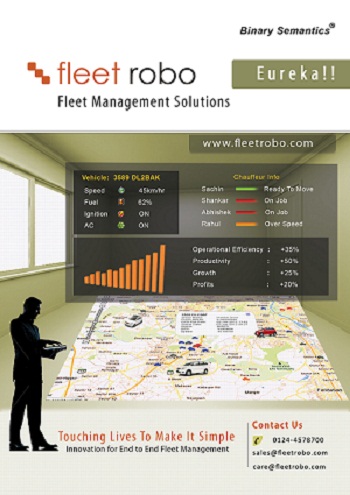“Time is an essence”, the phrase is very relevant in the competitive business landscape and fast pace life where we are flooded with enormous information and we feel paucity of time to analyze and utilize it for business decision-making for growth and profitability. Similarly, ever-increasing fuel prices is one more critical factor and an area of concern that can greatly affect business profitability. Both these factors compound largely for any organization involved in transportation or in regular fleet management activities. These factors are important because of the dependability of fleet operators on it, to provide seamless and cost-effective services.
In order to overcome and transform these factors in favour to increase productivity and profitability, Fleet Management software solutions, automatic dispatching solutions, and GPS vehicle Tracking solutions play an important role. The basic idea of having Fleet management system in the first place is to provide the best available solution to fleet owners and people who are managing the fleet to have complete control over the vehicle while on transit from one place to another.
Fleet management solutions provide the best possible route planning, with the help of GPS and mapping application for the shortest and possibly better available roads for the timely delivery of cargo. With real-time data available at the hands of fleet managers and fleet owners, they can access an accurate view of their dispatches, which helps in saving precious time. It also helps in curbing the wear and tear of the vehicles using better route planning by thoroughly analyzing previous trip-related information and data and thereby avoiding bad and congested roads with better planning.
In-built sensor alerts and reports help in the safe and secure transportation of perishable goods in cargo and hence ensure timely delivery. It’s a win-win situation for both fleet owners and their customers because of scheduled departure and arrival of cargo without any time delays. With smart route planning and information access of vehicle, fleet managers gets a competitive edge to avoid vehicle breakdowns, unnecessary stoppages, and time delays, which helps in saving lot of valuable time, even in eventuality, the secondary vehicle can be dispatched to avoid delays.
Better management of fleet routes results in a huge difference in fuel consumption as the best and shortest available routes planned to avoid delays and unnecessary stoppages saves a lot of fuel consumption for vehicles. The operational cost which is directly proportional to fuel cost also reduces. The overheads and reduced vehicle breakdowns help in saving time and money both. All these factors eventually help organizations to lower down the cost, and increase productivity and profitability for long-term success.
